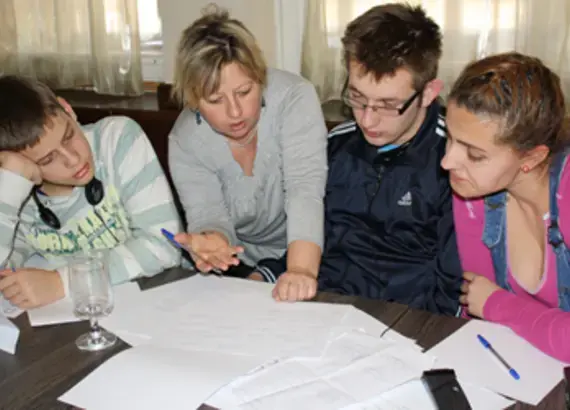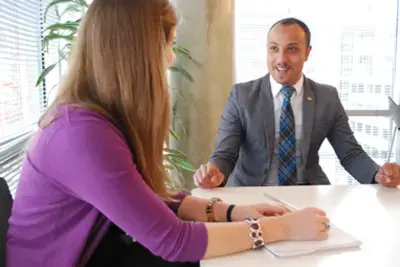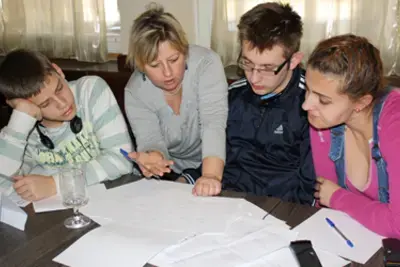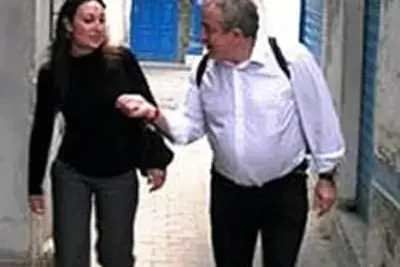
Success Story
Civic Engagement Helps Lower Barriers Between Roma and Non-Roma Youth
Seventeen-year-old Vlado has his eye on the future – going to college, learning English, perhaps even running for local office. His reality now is vocational school and a tiny house where he lives in a Roma settlement outside of Roskovce in eastern Slovakia. The challenge he faces is whether his enthusiasm and ambition will be enough to get him out of the cycle of poverty, exclusion, and violence that plagues this and many other isolated Roma settlements throughout Central and Eastern Europe.
Vlado is one of an estimated 10 million Romani citizens who comprise Europe’s largest and most excluded minority. Roma reap few benefits associated with democracy. They are routinely denied equal rights and access to housing, health care, education and employment. The worsening economic conditions of recent years have led the Roma to become targets of violence, inflicted particularly by impressionable young people susceptible to extremist movements, which have proliferated even in countries of the European Union, such as Hungary, Romania and Slovakia.
Seeking to reduce inter-ethnic tension and combat political extremism, NDI has been working with young Roma and non-Roma in Hungary and Slovakia to promote tolerance and cooperation through civic engagement among Roma and non-Roma youth. Funding comes from the Bureau of Democracy, Human Rights and Labor of the U.S. Department of State.
Vlado was one of 100 teenagers from eight rural towns selected by NDI to build cross-ethnic cooperation in civics, citizenship and politics – topics that are often foreign to youth who are frustrated with the political process and lack understanding of roles they could play in their communities.
NDI engaged participants in a civics course to learn how elections, lawmaking, and other parts of the democratic governments in Hungary and Slovakia work. The teenagers learned about the responsibilities of citizenship and experienced negotiation and decisionmaking in simulations of local elections and municipal council meetings. They also received training in such areas as grassroots advocacy, public speaking and project management. The most engaged participants were selected for internships in local mayors’ offices, civic groups working on women’s and children’s issues, and community centers.
To give the young people an opportunity to practice their skills, NDI organized a cross-border debate tournament, where, through interpreters, Roma and non-Roma participants from Hungary and Slovakia, in mixed teams, debated issues of common interest, including legalization of marijuana and the need for school uniforms.
Participants traveled to their respective capitals - Budapest and Bratislava - to participate in leadership academies. For many, this was the first time they had visited their capital cities. Participants met with national-level policymakers, political party youth wing representatives, and civic and political activists, among others, allowing them to see the practical application of what they had been learning.
With guidance and encouragement from program staff and local partners, participants then worked in their home areas on community betterment projects that used skills acquired through the program, such as program planning, negotiation and public speaking.
The young people created several youth clubs, established lines of communication with local police, led neighborhood clean-up and beautification efforts, and started after-school learning and sports programs for Roma children. They organized cultural events as well, including holiday celebrations, heritage days, and photo exhibits. None of these activities had occurred before in Roma settlements, much less in cooperation with non-Roma neighbors. Over 15 months, participants engaged more than 3,000 Roma and non-Roma people. For their efforts, they were honored by government officials and U.S. diplomats.
For his part, Vlado participated in the civic education course and then was one of the Slovak participants selected for the internship program. He was placed at the Roskovce Community Center, where he worked with local Roma children ages 6 to 16. Along with the center coordinator, he helped children with homework, created activities to keep them engaged during afternoon and evening hours, and tutored them in reading and writing. A student of guitar, Vlado offered guitar lessons to interested kids. He did a second internship at the municipal office in the nearby town of Spissky Hrhov, where he learned administrative skills, helped citizens complete forms so they could receive city services and assisted in the distribution of municipal information in villages.
“I believe that my work was helpful to other people – the children have improved their outcomes at school and the adults have seen that even us, the youth, are able to do some important work,” Vlado said.
When the internship ended, Vlado continued to volunteer at the Community Center in an effort to help the children. And with his fellow program participants, he completed a project working with the mayor of Roskovce and the leader of a local church to create rest areas in the community. They gathered community support and funding to construct benches and enlisted volunteers from a group of unemployed men to help install them.
"I feel that during the program I became more adult,” Vlado said. “Now I am able to express my thoughts much better than before and I also started to think about my future career in a different way."
Since the conclusion of the program, Vlado and his peers from the Hungarian and Slovak groups have taken the initiative to establish parallel youth organizations in each country, called “Younited,” as a step toward ensuring sustainability of their work and a commitment to improving and strengthening their communities.
Read more:
Published Sept. 20, 2013



